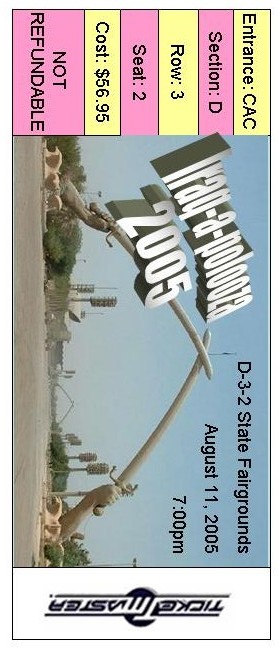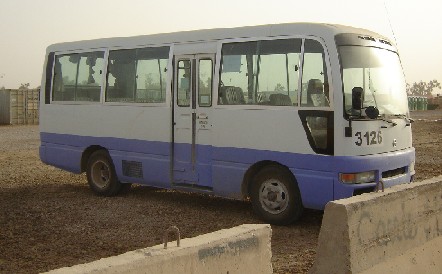Almost everyone who manages a contract in Iraq complains about security issues. When a contractor wants to buy something related to security, it is very hard to know what is justified and what is excessive. Most of the time, the contract manager errs on the side of caution and approves the security-related request regardless of how expensive it is. As a result, security costs are consuming a large part of the Iraq reconstruction funds. According to Heather Layman, spokeswoman for USAID, security costs account for an average of 22 percent of a project's cost.
The cost of security guards is one of the largest components of any company’s security costs. The U.S. Department of Defense (DoD) estimates there are 60 private security firms with as many as 25,000 employees in Iraq. Some elite personnel with these companies make $33,000 a month. As of December 2004, the agencies and contractors in Iraq
recently reviewed by the Government Accountability Office (GAO) had obligated more than $766 million for private security providers in Iraq. (GAO didn’t look at every contractor, so that total cost is probably much higher.)
According to the GAO, "contractor officials acknowledge that the cost of private security services and security-related equipment, such as armored vehicles, has exceeded what they originally envisioned. In some cases, increased security costs resulted in reducing or canceling the scope of some reconstruction projects."
To help deal with the significant increases in security costs, GAO recommended that the Secretary of Defense, Secretary of State, and the USAID Administrator should help reconstruction contractors obtain reliable security services (rather than wasting their money on
untrustworthy security contractors) and develop a plan to handle security costs in the future. The State Department disagreed with the "recommendation to explore options to assist contractors in obtaining private security services, citing concerns that the government could be held liable for performance failures." Additionally, the State Department did not clearly explain how it intends to "track and account for private security costs, which is essential given that DoD and USAID are the principal agencies responsible for awarding and managing the majority of reconstruction contracts."
Posted by alohafromtim
at 11:43 PM EDT

 The U.S. government provides most of my basic needs, which is surprising considering how difficult it is to get anything into Iraq that meets the Western standards that Americans demand. As an added hassle, if the items are bought from an Iraqi, a brave person has to drive through the streets of Baghdad, pass through the often-deadly Green Zone check points, and then get through the occasional military shakedown to reach my compound. What makes it all the more surprising to me is how ad-hoc the whole process seems even though it successful. For example, the other day I came across a truck stuffed with toilet paper in a fashion that reminded me of the third world.
The U.S. government provides most of my basic needs, which is surprising considering how difficult it is to get anything into Iraq that meets the Western standards that Americans demand. As an added hassle, if the items are bought from an Iraqi, a brave person has to drive through the streets of Baghdad, pass through the often-deadly Green Zone check points, and then get through the occasional military shakedown to reach my compound. What makes it all the more surprising to me is how ad-hoc the whole process seems even though it successful. For example, the other day I came across a truck stuffed with toilet paper in a fashion that reminded me of the third world. The Americans are building a large power plant near Kirkuk. Transporting the plant's 700 ton new turbine from the Jordanian border to Kirkuk was a major challenge and took the combined efforts of over 300 soldiers. The turbine went on a 640 mile journey through some of the most dangerous areas of Iraq, yet it arrived without a scratch. The reporters who covered the story didn't mention that the project now costs about twice as much as originally expected and is months behind schedule. In fact, the reporters didn't even mention that although this plant is a significant achievement, it will do little to truly solve the electricity shortage in Iraq. In essence, the reporters left out a number of important facts to maintain the positive spin of the story.
The Americans are building a large power plant near Kirkuk. Transporting the plant's 700 ton new turbine from the Jordanian border to Kirkuk was a major challenge and took the combined efforts of over 300 soldiers. The turbine went on a 640 mile journey through some of the most dangerous areas of Iraq, yet it arrived without a scratch. The reporters who covered the story didn't mention that the project now costs about twice as much as originally expected and is months behind schedule. In fact, the reporters didn't even mention that although this plant is a significant achievement, it will do little to truly solve the electricity shortage in Iraq. In essence, the reporters left out a number of important facts to maintain the positive spin of the story. It is surprising how little it takes to bring a smile to someone's face in Iraq. At last night’s party, I hid a bucket filled with little squirt guns. Eventually someone found them and started squirting people. Then, everyone tried to get their hands one of the thirty squirt guns I had purchased. After that, someone foolishly squirted a man who had a trio of very large squirt guns. Needless to say, the whole party quickly escalated into a small scale war and everyone ended up getting a least a little wet. It helped them blow off the steam that had built up over the last few weeks.
It is surprising how little it takes to bring a smile to someone's face in Iraq. At last night’s party, I hid a bucket filled with little squirt guns. Eventually someone found them and started squirting people. Then, everyone tried to get their hands one of the thirty squirt guns I had purchased. After that, someone foolishly squirted a man who had a trio of very large squirt guns. Needless to say, the whole party quickly escalated into a small scale war and everyone ended up getting a least a little wet. It helped them blow off the steam that had built up over the last few weeks.
 I am throwing another big party at my house tonight. As usual, I am discovering that organizing a party is very, very difficult. I have to order all my decorations online weeks in advance, and if at the last minute I suddenly discover that I am missing something that I needed for the party, such as rope of duck tape, I cannot simply go to the corner store and buy what I am missing. (Sadly, Walmart hasn’t opened a store inside the Green Zone.) I am forced to ask around to see if someone else has what I need, or I have to find some type of makeshift substitute.
I am throwing another big party at my house tonight. As usual, I am discovering that organizing a party is very, very difficult. I have to order all my decorations online weeks in advance, and if at the last minute I suddenly discover that I am missing something that I needed for the party, such as rope of duck tape, I cannot simply go to the corner store and buy what I am missing. (Sadly, Walmart hasn’t opened a store inside the Green Zone.) I am forced to ask around to see if someone else has what I need, or I have to find some type of makeshift substitute.

 While eating dinner at the Palace a few months back, someone told me that he was concerned that a US subcontractor may be paying bribes to a gang. The payments were essentially "protection" money to prevent the thugs from attacking a reconstruction site. These thugs were connected to the insurgency, which means the protection money probably helped finance the insurgency. Thus, US money was probably being channeled back toward killing Americans. Of course, I don't know the name of the company and this person would not talk about it on the record, so essentially all I heard was a rumor. All the same, this rumor seems very probable and troubling.
While eating dinner at the Palace a few months back, someone told me that he was concerned that a US subcontractor may be paying bribes to a gang. The payments were essentially "protection" money to prevent the thugs from attacking a reconstruction site. These thugs were connected to the insurgency, which means the protection money probably helped finance the insurgency. Thus, US money was probably being channeled back toward killing Americans. Of course, I don't know the name of the company and this person would not talk about it on the record, so essentially all I heard was a rumor. All the same, this rumor seems very probable and troubling.
 Shortly after the attack, the Secretary General said that the United Nation would not return until the security of its staff was assured.
Shortly after the attack, the Secretary General said that the United Nation would not return until the security of its staff was assured. Thankfully, the US military has established barber shops at military exchanges throughout Iraq, and the U.S. State Department has built a small barber shop in the Palace. Hair cuts inside the Green Zone only cost $3, and for the most part, they aren't too bad considering that fashion is not the top concern in Iraq and most people are getting military flattops.
Thankfully, the US military has established barber shops at military exchanges throughout Iraq, and the U.S. State Department has built a small barber shop in the Palace. Hair cuts inside the Green Zone only cost $3, and for the most part, they aren't too bad considering that fashion is not the top concern in Iraq and most people are getting military flattops. The Second Iraq Emergency Supplemental Appropriations Bill (Public Law 108-106) requires the Bush Administration to submit a report to Congress every 90 days that updates the estimates and assumptions for the $18.4 billion appropriated to help rebuild Iraq. Preparing this report, which is known as the
The Second Iraq Emergency Supplemental Appropriations Bill (Public Law 108-106) requires the Bush Administration to submit a report to Congress every 90 days that updates the estimates and assumptions for the $18.4 billion appropriated to help rebuild Iraq. Preparing this report, which is known as the 